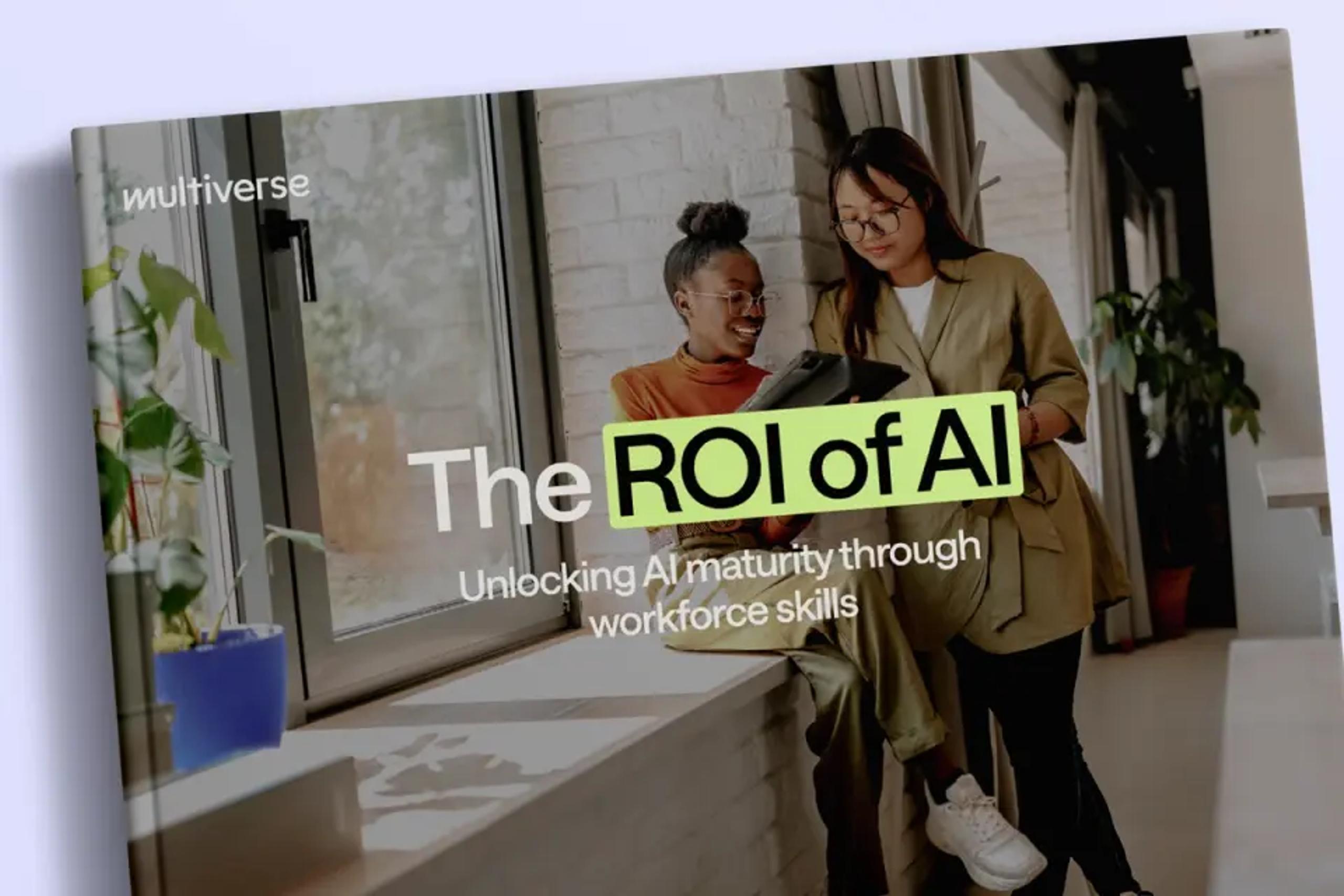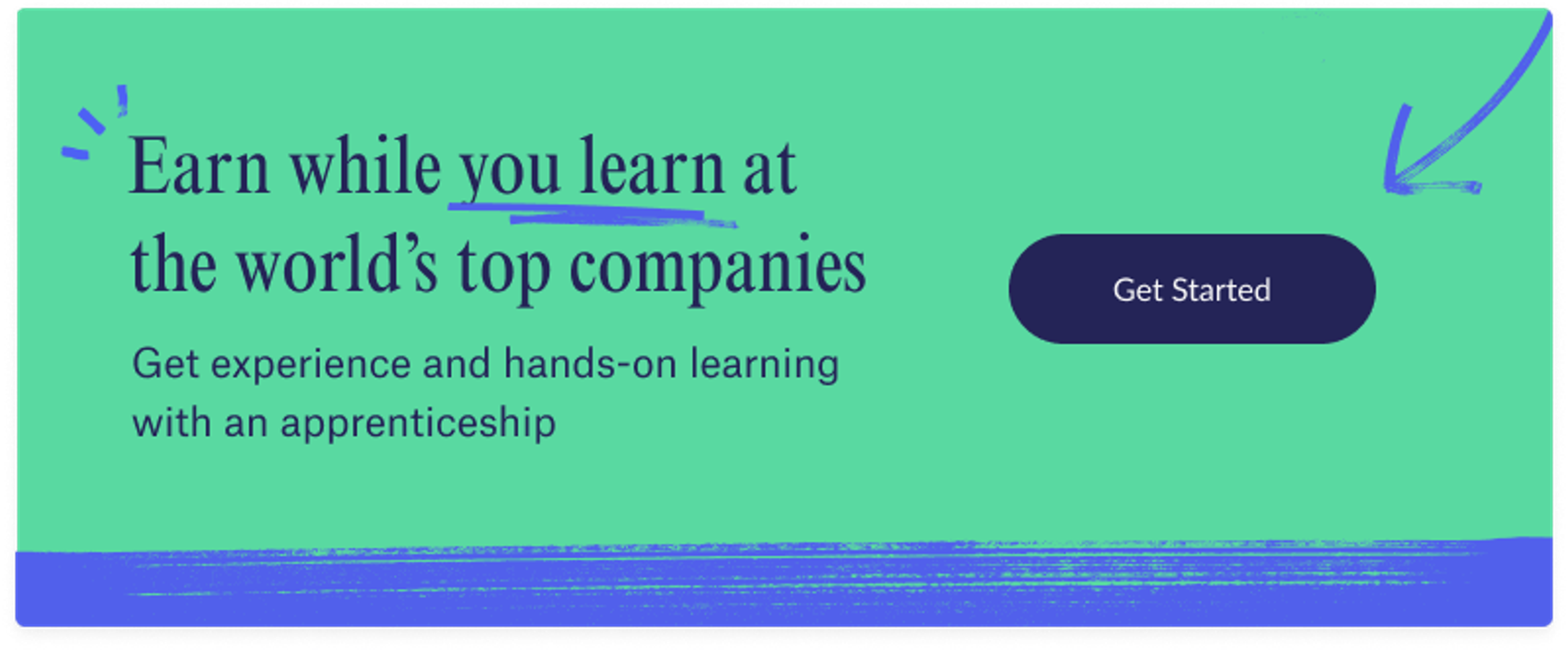In the next three years, 79% of business and technology leaders(opens new window) predict that artificial intelligence (AI) will revolutionize their organizations and industries. Many businesses have created new AI jobs to help them navigate this transformation.
Professionals with AI expertise pursue careers in a broad range of sectors. For example, the healthcare industry has embraced AI to streamline documentation(opens new window) and improve medical imaging analysis(opens new window). The marketing sector uses generative AI to create personalized content(opens new window) and automate tasks. This versatile technology also has numerous applications in e-commerce, finance, manufacturing, and other industries.
However, many organizations need more skilled talent to take full advantage of AI. In 2023, over 60% of businesses(opens new window) had difficulty hiring Machine Learning Engineers, AI Data Scientists, Data Architects, and other AI professionals.
You can help fill this demand by developing essential skills for AI jobs in 2024. Below, we’ll explore the top AI career paths, must-have skills, and strategies to land your first AI job.
Why AI Skills are in high demand
The demand for AI has exploded in the last decade, and this trend shows no signs of slowing down. Bloomberg Intelligence(opens new window) predicts that the generative AI market will grow from $40 billion in 2022 to $1.3 trillion in 2032. This rapid expansion will create new job opportunities and transform industries worldwide.
Several factors have contributed to the high demand for AI careers. Many businesses use AI to drive innovation and increase productivity. For example, this technology allows organizations to hyper-personalize customer experiences and develop new products. Businesses can also use AI to automate repetitive tasks like data entry and credit scoring. Organizations need skilled AI professionals to leverage these capabilities and create innovative solutions.
The exponential growth of big data has also fueled the need for AI skills. Between 2020 and 2025, the amount of data generated and consumed globally(opens new window) is expected to triple from 64 zettabytes to 180 zettabytes. Businesses can use AI algorithms to process, analyze, and gain insights from this big data.
Top AI jobs for 2024
Spend a few minutes browsing job boards, and you’ll find many artificial intelligence careers. However, some positions have more lucrative salaries and better growth prospects than others. Here are the top AI jobs for 2024.
Machine Learning Engineer
A Machine Learning (ML) Engineer creates and implements self-learning AI models and systems. They design algorithms–or sets of instructions–that allow machines to interpret and learn from data in a human-like manner.
ML Engineers often work in healthcare, finance, tech, and other industries that depend on data to make decisions.
Salary data
- Lowest 25% - starts at $102,000
- Average base salary - $129,000
- Salary for top earners - $178,000
Source: ZipRecruiter(opens new window)
Data Scientist
A Data Scientist collects, analyzes, and visualizes raw data to gain novel insights and inform decision-making. They also use ML algorithms and statistical models to classify data, uncover hidden trends, and predict future outcomes.
The Bureau of Labor Statistics (BLS) predicts that the demand for Data Scientists will grow by 35% between 2022 and 2032. These professionals often work in e-commerce, healthcare, insurance, and telecommunications.
Salary data
- Lowest 25% - starts at $99,000
- Average base salary - $123,000
- Salary for top earners - $173,000
Source: ZipRecruiter(opens new window)
Robotics Engineer
A Robotics Engineer designs, codes, builds, and maintains robotic systems. They develop algorithms that allow robots to perform complex tasks autonomously or semi-autonomously. For example, Robotics Engineers program robots to interact with humans and navigate the ocean floor.
Robotics Engineers play vital roles in the agriculture, automotive, healthcare, and manufacturing sectors.
Salary data
- Lowest 25% - starts at $84,000
- Average base salary - $106,000
- Salary for top earners - $156,000
Source: ZipRecruiter(opens new window)
Software Engineer
A Software Engineer develops, tests, and updates software applications. They can use AI to automate repetitive tasks, write code, and troubleshoot bugs.
According to the BLS, the demand for software development will increase by 26% from 2022 to 2032(opens new window). Many industries hire Software Engineers, including business, finance, healthcare, retail, and tech.
Salary data
- Lowest 25% - starts at $120,000
- Average base salary - $148,000
- Salary for top earners - $205,000
Source: ZipRecruiter(opens new window)
Business Intelligence Developer
A Business Intelligence Developer uses data analytics and software to collect, interpret, and visualize business data. AI-powered software can help them analyze data and design business interfaces more efficiently.
Many Business Intelligence Developers work for consulting firms, government agencies, financial institutions, and large corporations.
Salary data
- Lowest 25% - starts at $92,000
- Average base salary - $112,000
- Salary for top earners - $150,000
Source: ZipRecruiter(opens new window)
Essential skills for AI jobs
Employers expect candidates to have a broad range of technical and soft skills for AI jobs. Here are the essential abilities you’ll need to succeed in these roles.
Machine learning
AI professionals use data and algorithms to develop and train ML models that learn and improve without human input. ML requires a strong understanding of probability and statistics. You’ll use these mathematical concepts to analyze data, design predictive models, and assess their performance. You can also use ML libraries like PyTorch and TensorFlow to create and deploy models.
Natural language processing
Natural language processing (NLP) is a subfield of AI that uses ML algorithms to understand and respond to complex human language. AI professionals use many techniques to develop NLP models like ChatGPT. For example, sentiment analysis involves assessing text or speech for emotional tone. Topic modeling is another method used to identify themes in data.
AI specialists can streamline the development of NLP models with spaCY, NLTK, TextBlob, and other libraries and frameworks.
Proficiency in programming languages
Every AI career path requires knowledge of programming languages. Python’s simple syntax and vast libraries make it the most popular choice for data analysis and ML. Other useful languages for AI professionals include:
- Java - to design complex algorithms
- JavaScript - to develop web-based ML applications
- R - for data processing and visualization
You don’t need to master all these languages, especially for entry-level AI careers. Instead, you should research the requirements for careers you're interested in to determine which programming languages to learn.
Problem-solving
AI experts work with complex and cutting-edge technologies, so it’s normal to encounter obstacles during projects. For instance, your algorithm may make wildly inaccurate predictions, or you might struggle to find high-quality data. Strong problem-solving skills will help you troubleshoot issues and develop creative solutions.
Collaboration
AI professionals often work on complex projects that require expertise in multiple disciplines. For example, they may work with Data Scientists, Project Managers, and Product Developers. Strong collaboration skills will enable you to tackle these projects in cross-functional teams. Practice sharing your knowledge with people from different backgrounds and resolving conflicts.
Communication
AI and ML are complex topics that involve advanced technical concepts and specialized jargon. Strong communication skills will allow you to explain these ideas to stakeholders from various backgrounds. For instance, you may need to present your findings to non-technical clients and Project Managers. You can prepare for these situations by practicing simplifying complex ideas and translating jargon into plain language.
AI ethics
Many challenging ethical dilemmas surround AI, leading to widespread concerns about this technology. According to a 2023 PrivacyHawk survey(opens new window), 80% of Americans worry that companies will use their personal data to train AI models, and 48% fear AI will negatively affect them.
You can help assuage these fears by following ethical AI practices. Always obtain consent before using data, and practice transparency by documenting the methodologies and sources used.
How to acquire AI skills
Here are four possible avenues to develop the necessary skills for AI jobs.
University degrees
Some people obtain a degree in computer science, data science, mathematics, or statistics. This path allows you to gain relevant skills through a structured curriculum. But, you may not have the opportunity to develop AI-specific projects and experience. A university degree also requires a significant investment of money and time.
AI boot camps
A boot camp is an intensive program that focuses on work-ready skills. Participants also gain hands-on experience with AI projects. Some boot camps have low placement rates and high price tags, so research programs carefully before enrolling.
Multiverse's AI Taster Modules are free for all learners through our platform. Benefit from fast, action-oriented lessons on AI core concepts, including prompt engineering and AI ethics. Start learning today(opens new window).
Self-study resources
Many websites offer free online classes, tutorials, and other resources. Aspiring AI professionals can use these materials to learn about data science, ML, programming languages, and other key concepts. Self-studying lets you learn at your own pace, but the lack of structured guidance can lead to knowledge gaps.
Apprenticeships
An apprenticeship allows you to acquire hands-on experience and follow a structured curriculum designed by AI experts. Apprentices also earn a competitive salary and build a professional network in their chosen industry.
Building a portfolio for AI jobs
You don’t need a university degree to pursue a career in AI, but you’ll need to show potential employers you have the right skills. Developing an online portfolio is the most effective way to showcase your abilities.
Start by developing hands-on projects that use a diverse array of AI skills. Here are a few project ideas:
- AI chatbot
- Image classification model
- Music generation model
- NLP-powered virtual assistant
- Predictive analytics model to forecast the weather or the outcome of sporting events
- Sentiment analysis tool to evaluate social media posts
These projects allow you to apply theoretical concepts to real-world scenarios. You can also gain practical experience by using real, free datasets to develop and train your AI models. Potential sources for datasets include Kaggle, GitHub, Data.gov, and the r/datasets subreddit.
As you create projects, assemble them into an online portfolio. Some tech professionals build a website from scratch to house their projects. You can also use a portfolio hosting website like Carrd, Notion, and Webflow.
Provide context with detailed descriptions, screenshots, and other supporting materials for each project. Link this portfolio in your application materials so potential employers can assess your skills.
The future of AI Jobs
AI is reshaping the future of work across industries. According to the Pew Research Center(opens new window), 19% of American workers have careers that AI technologies could significantly impact. These employees may have some or most of their current duties replaced by AI soon.
This prediction may sound scary, but many companies won’t eliminate these jobs completely. Instead, AI can enhance existing roles and allow workers to focus on complex tasks that require human minds.
AI will also open new career opportunities for many employees. 36% of employers(opens new window) are already making a strong effort to reskill workers affected by generative AI. This percentage will likely grow as emerging technologies(opens new window) like multimodal AI and small language models create new roles.
Developing AI skills now can help you future-proof your career and gain a competitive advantage in this shifting landscape. As you gain experience, you may qualify for more advanced–and often more lucrative–roles in AI.
Here are some of the top artificial intelligence careers in the U.S. and their average base salaries:
- Computer Vision Engineer - $122,000
- Data Engineer - $130,000
- Big Data Engineer - $130,000
- AI Research Scientist - $130,000
- Machine Learning Software Engineer - $148,000
Source: ZipRecruiter(opens new window)
Landing your first AI job
Developing the skills for AI jobs will help you become a competitive applicant, but you’ll still need to put in the legwork to land your first position.
Networking is one of the best ways to learn about AI job openings and connect with other professionals. Consider joining professional organizations like the International Machine Learning Society and the AI Association. These associations often organize conferences, webinars, and other networking events.
You should also continuously learn about AI advancements so you can discuss cutting-edge developments during job interviews. Stay in the loop by following thought leaders on social media, reading industry news, and joining online AI communities.
Level up your AI skills with Multiverse
There’s never been a better time to launch a career in artificial intelligence. Many employers are excited to leverage this new technology and eager to hire talent with the right skills.
Prepare for opportunities in this rapidly growing field by developing or expanding AI skills. The top AI jobs in 2024 require excellent technical and interpersonal abilities. You’ll need a strong foundation in programming languages, machine learning, and natural language processing. Many careers also require soft skills like communication and collaboration.
Multiverse’s free apprenticeships will help you develop the necessary AI skills and gain hands-on experience. Learn how to leverage data with our Advanced Analytics program. All Multiverse apprentices get access to our exclusive AI Jumpstart module.
Fill out our fast apprenticeship application(opens new window) to start your journey.








